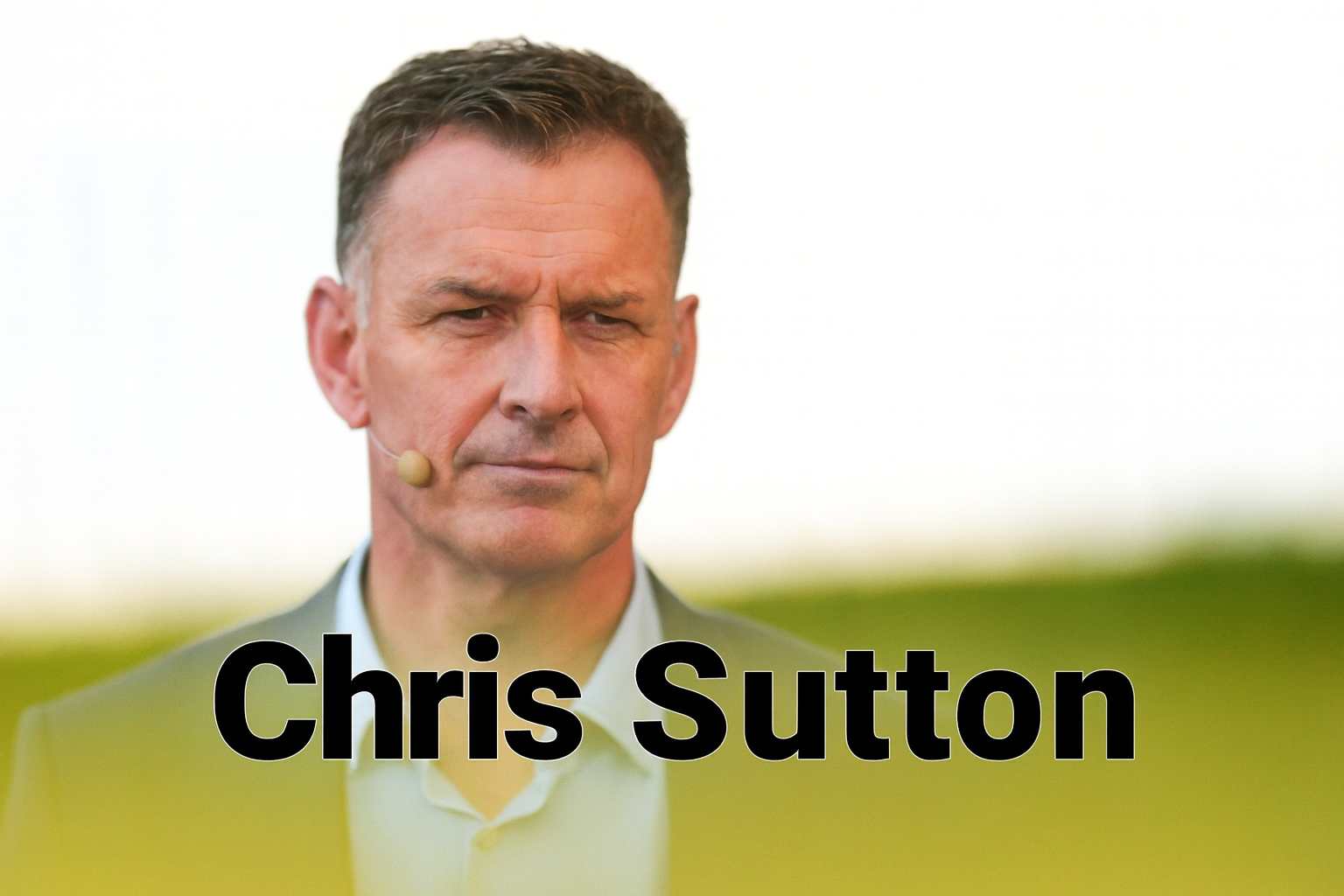Chris Sutton – Triumphs, Struggles, and Legacy of an English Former Football Player and Manager
From Premier League Champion to Celtic Icon and Respected Football Pundit

Table of Contents
ToggleIntroduction
Chris Sutton is a name that resonates strongly in both English and Scottish football. Known for his powerful presence on the pitch, sharp aerial ability, and uncompromising style, Sutton carved out a reputation as one of the most versatile and determined strikers of his generation. His journey through clubs such as Norwich City, Blackburn Rovers, Chelsea, and Celtic reflects a career of triumphs, struggles, and remarkable comebacks.
Beyond the playing field, Sutton’s life story carries elements of controversy, resilience, and reinvention. From his early days in Nottingham to his rise as a Premier League winner and later a media personality, Sutton’s biography offers valuable lessons in persistence and adaptability.
Quick Bio
| Attribute | Details |
|---|---|
| Full Name | Christopher Roy Sutton |
| Date of Birth | 10 March 1973 |
| Birthplace | Nottingham, England |
| Nationality | English |
| Height | 6 ft 3 in (1.91 m) |
| Parents | Father – Mike Sutton |
| Sibling | Brother – John Sutton |
| Marital Status | Married |
| Children | Six |
| Profession | English former football player, manager, pundit |
Early Life and Background
Born in Nottingham, England, Chris Sutton grew up in a football-oriented household. His father, Mike Sutton, had played professionally, and this environment nurtured Chris’s natural talent for the sport. Moving to Norfolk at a young age, Sutton developed his skills in local football, initially playing as a defender before being converted into a striker.
This transition proved to be a turning point. His height, physical strength, and sharp instincts made him perfectly suited for the forward role. By the time he broke into professional football with Norwich City, Sutton was already demonstrating qualities that would make him one of the most talked-about strikers of his era.
The Start of a Professional Career
Chris Sutton made his senior debut for Norwich City in 1991. At first, he was deployed in defensive positions, but coaches quickly recognized his attacking potential. By the 1993–94 season, Sutton was among the most feared strikers in the Premier League, netting 25 league goals and establishing himself as a rising star.
His form at Norwich not only gained him national recognition but also attracted interest from top clubs. Sutton’s ability to score from headers, dominate defenders, and deliver in crucial moments made him a natural candidate for bigger stages.
Blackburn Rovers and Premier League Glory
In 1994, Sutton made a high-profile move to Blackburn Rovers for a record fee at the time. It was here that he formed the legendary strike partnership with Alan Shearer, famously known as the “SAS.” The duo became a nightmare for defenders, combining power, finishing, and tactical understanding.
Sutton’s most significant achievement came in the 1994–95 season when Blackburn Rovers won the Premier League. His 15 goals played a crucial role in securing the club’s first top-flight title in decades. This success etched his name permanently into English football history, marking the peak of his career in England.
Challenges at Chelsea
In 1999, Sutton joined Chelsea for £10 million, but his time at the club was marked by frustration. Despite high expectations, he struggled to adapt, scoring just one league goal. The move highlighted the unpredictable nature of football, where even talented players can face difficulties when circumstances do not align.
Although this chapter of his career is often viewed as a disappointment, Sutton’s resilience allowed him to bounce back. His next move to Scotland would prove transformative.
Celtic Years – The Rise of a Legend
Sutton joined Celtic in 2000, and this move revitalized his career. His debut season saw him score crucial goals, including two in a famous 6–2 victory over Rangers in the Old Firm derby. At Celtic, he developed an incredible partnership with Henrik Larsson, contributing to one of the club’s most successful periods in modern history.
During his six years with the Scottish giants, Sutton won four Scottish Premier League titles, three Scottish Cups, and one Scottish League Cup. He also played a key role in Celtic’s run to the 2003 UEFA Cup Final. His aggressive style, leadership, and knack for big-game goals made him a cult hero among Celtic supporters.
Later Career and Retirement
After leaving Celtic in 2006, Sutton had short spells with Birmingham City and Aston Villa. Unfortunately, an eye injury forced him to retire in 2007. Though his later playing years were curtailed, his impact had already been cemented in both English and Scottish football.
In 2012, Sutton briefly returned for a one-off appearance with non-league side Wroxham, where his son Oliver was playing as a goalkeeper. It was a symbolic moment, showing his enduring connection to the game and his family.
International Career
Sutton earned caps for England at under-21 and B levels before making his only senior appearance in 1997 against Cameroon. However, a dispute with then-England manager Glenn Hoddle, after Sutton refused to play for the B team, effectively ended his international career. Despite this, his domestic achievements ensured his name remained well respected.
Managerial Role at Lincoln City
In 2009, Sutton transitioned into management when he was appointed boss of Lincoln City. His first season showed promise as he guided the team to league safety and an FA Cup third-round appearance. However, he resigned a year later, citing personal reasons. This brief managerial spell highlighted his tactical understanding but also emphasized the challenges of management compared to playing.
Punditry and Media Career
Following retirement, Sutton became a successful pundit and commentator. He has worked with BBC Radio 5 Live, BBC Sport, and later Sky Sports, where his outspoken views and fearless analysis have gained attention. His ability to combine sharp critique with humor makes him a distinctive voice in football media.
In 2023–24, his BBC salary was reported between £190,000 and £194,999, showcasing his value as a media personality. Today, he remains one of the most recognized English former football players turned pundits.
Legacy
Chris Sutton’s legacy is defined by versatility, resilience, and an unshakable will to succeed. As a striker, he won the Premier League, dominated Scottish football with Celtic, and became part of one of the greatest strike partnerships in English history.
Though his career included challenges—such as his struggles at Chelsea and his short international spell—Sutton transformed setbacks into opportunities. His successful media career demonstrates his ability to adapt beyond the pitch, ensuring his continued relevance in football. For Celtic fans, he remains an icon; for English football, he is remembered as a powerful forward who reached the pinnacle of the game.
Conclusion
Chris Sutton’s life is a story of highs and lows, triumphs and disappointments, and ultimately, a legacy that continues to inspire. From his early days at Norwich City to his peak with Blackburn and Celtic, he showcased qualities of determination and leadership. His later roles as a manager and pundit underline his enduring contribution to the sport.
Sutton’s journey reminds us that success in football is not only measured by goals and trophies but also by the ability to rise after setbacks and remain a lasting influence.
FAQs
Q1: Who is Chris Sutton?
Chris Sutton is an English former football player, manager, and current pundit, best known for playing with Norwich City, Blackburn Rovers, Chelsea, and Celtic.
Q2: What is Chris Sutton’s greatest achievement?
His biggest achievement was winning the Premier League with Blackburn Rovers in the 1994–95 season and becoming a Celtic legend with multiple domestic titles.
Q3: Did Chris Sutton play for England?
Yes, he earned one senior cap in 1997 against Cameroon, along with appearances for England’s youth and B teams.
Q4: When did Chris Sutton retire?
He retired in 2007 due to an eye injury suffered while playing for Aston Villa.
Q5: What does Chris Sutton do now?
He works as a football pundit and commentator, regularly appearing on BBC and Sky Sports.



